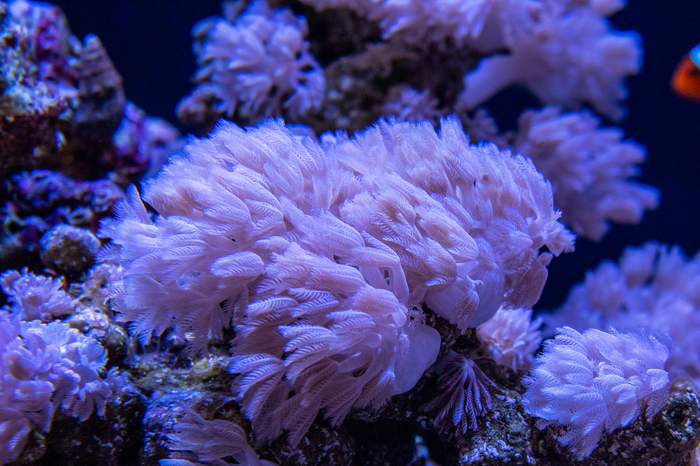According to a new study headed by Carnegie’s Yixian Zhen and Minjie Hu, coral cells tag friendly algae before consuming them, so beginning a mutually beneficial connection. This data could help guide future coral conservation initiatives.

The soft, pulsing Xenia coral growing in Carnegie’s coral research facility in Baltimore. Image Credit: Ed Hirschmugl and Navid Marvi, courtesy of the Carnegie Institution for Science
Their findings were reported in the journal Nature Microbiology.
Corals are marine invertebrates that produce exoskeletons that are used to build reefs. This architecture, however, is only feasible due to a mutually beneficial interaction between the coral and numerous species of single-celled algae known as dinoflagellates, which dwell inside individual coral cells.
These algae use photosynthesis to turn the Sun’s energy into food, and they share some of the nutrients they create with their coral hosts.
Coral reefs are extremely valuable in terms of ecology, economics, and aesthetics. They provide food and tourism to many communities. However, human activity is putting a burden on these vulnerable communities. Warming oceans, pollution, and acidification have an impact on this symbiotic relationship.
Many corals are particularly sensitive to elevated temperatures. As oceans heat up, they lose algae, starve due to the lack of nutrients, and die off, a phenomenon called bleaching, because it leaves the coral skeleton looking ghostly white.
Minjie Hu, Carnegie Institution for Science
Carnegie scientists, including Zheng and Hu, have been studying the molecular and cellular mechanisms underlying coral-algae symbiosis for several years. Understanding these mechanisms may help to develop efforts for preventing bleaching and promoting coral resilience.
The researchers, who included Carnegie’s Yun Bai and Xiaobin Zheng, used powerful bioinformatic and molecular biology technologies to reveal the early stages of symbiosis when the algae are taken up by the coral.
They discovered a molecule known as LePin, which the coral secretes. It is concentrated in coral mouths, where it may attach to entering algae and label them for uptake into coral cells.
Understanding how corals tell which algae to take up is an important step in gathering information that will help us mitigate coral bleaching.
Xiaobin Zheng, Carnegie Institution for Science
LePin is found in soft corals, stony corals, and anemones that live in symbiosis with algae, which suggests that it could be a viable target for efforts to genetically modify at-risk corals to boost their hardiness in the face of rising temperatures.
Gaining a deeper understanding of LePin could enable us to differentiate how some species of coral are better able to identify and take up heat-resistant algae than others. Once isolated, the LePin sequences that are capable of identifying hardier and more heat-resistant algae could be transplanted into vulnerable coral populations to reduce bleaching events.
Xiaobin Zheng, Carnegie Institution for Science
Zheng was one of 15 scientists chosen in 2020 to receive a very competitive grant from the Gordon and Betty Moore Foundation to pursue research on symbiosis in aquatic systems. She has been expanding on Carnegie’s long-standing model organism development history to better understand the molecular underpinnings of coral endosymbiosis.
These efforts demonstrate how current biomedical approaches can be used to address pressing ecological concerns—a research priority for Carnegie.
The study was funded by the Gordon and Betty Moore Foundation.
Journal Reference
Hu, M., et al. (2023). Coral–algal endosymbiosis characterized using RNAi and single-cell RNA-seq. Nature Microbiology. doi.org/10.1038/s41564-023-01397-9.